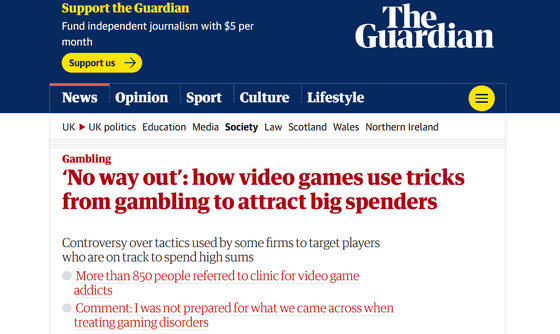Pointed out that basic free mobile games and social games are using gambling industry tricks to attract players who charge high prices

Many social games that use SNS as a platform and mobile games that can be played on smartphones can be played for free. However, even with the free basics, you will have to pay to get items and collectibles that will give you an advantage in progressing through the game. Companies that operate these basic free games strategically emphasize ``how to make players spend money'', and some incorporate methods used in the gambling industry, subject to regulation It's becoming a reality, according to the British daily The Guardian.
'No way out': how video games use tricks from gambling to attract big spenders | Gambling |
https://www.theguardian.com/society/2023/jul/14/video-games-gambling-big-spenders

In 2016, Torulf Jernström, CEO of game development company Tribeflame, gave a lecture titled 'Let's Go Whaling' at a conference held in Finland. In this lecture, based on the prediction that ``the mobile game industry will eventually grow to 100 billion pounds (about 18 trillion yen) annually'', several tricks to withdraw money from game players were introduced.
CEO Jernström exploits the player's immersion in the game, or the 'impulsive emotion' caused by the dynamics of the game, and uses in-game currency that can be purchased with real money to play the game. He argues that it is effective to give the opportunity to proceed with a time limit. For example, we introduce a method of ``taking advantage of the human tendency to avoid short-term losses, first offering in-game items for free, and then urging players to take them away if they don't pay.'' Did.
In addition, Jernström, who proposed a trick to ``exploit the crowd psychology by revealing the details of the amount that other players are using and encourage the use of money,'' said, ``Whatever you do, , It's a 'poison' to admit that the majority of players don't charge at all.' Jernström said that the series of lectures was intended to provoke the industry to question morals and encourage frank discussion.

After Jernström's speech became a hot topic, the mobile game market became more and more huge, instead of shrinking, and between 2016 and 2018 the market size of social games was $ 27 billion (about 3.76 trillion yen). It is said that it has expanded from 54 billion dollars (about 7.53 trillion yen). After that, although it stagnated once in 2019, it started to grow again in the wake of the pandemic of the new coronavirus, and is expected to break through the $ 100 billion (about 14 trillion yen) wall in 2025.
The trick Jernström said is the same as what casinos and bookmakers actually use. Of course, unlike real money gambling, social and mobile games only offer prestige and a sense of accomplishment, but some players see value in it and are willing to spend money.
Gemma Doyle, vice president of player success at Zynga , which develops social and mobile games, reveals that there is an in-house model for identifying and monitoring high-paying players. According to Doyle, if a player who spends a lot of money suddenly reduces the charge, he will call the player and ask 'Why did you reduce the charge?' Such behavior is considered pressure-bearing behavior and is legally regulated in the gambling industry, but not in the social gaming industry.
“Social game companies are trying to be fair and not make players feel like they are being used,” said Ries van Roesel, a researcher in mobile games at the Martin Luther University Halle-Wittenberg . It's about giving a sense of being there,' he said. Rosell cites the popular game ' Candy Crush ' as an example, saying, 'Many of the players of 'Candy Crush' are casual players, and less than 10% of the players are paying. However, the number of players of 'Candy Crush' is There are so many of them themselves, so if only 1% charges 1 euro (about 156 yen) more, it will make a lot of money.'

Also, as a testimony from a source in the game design industry, The Guardian said, `` Modify the random number generator that affects the outcome of the game, let the player experience the game, win big, and then greatly reduce the chances of winning. It gives players a reason to pay to advance in the game,' some companies boasted.
The Guardian also points out that loot boxes (gachas), which have become commonplace in games, are blurring the boundaries between games and gambling. Loot boxes are random in-game items such as weapons and costumes, and players keep buying loot boxes until they get the item they want. Loot boxes are a huge revenue booster for games, and they are now in every social game.

In the UK, due to the spread of online casinos, the number of people who fall into gambling addiction has increased rapidly, and it has become a social problem. We have a 'self-exclusion program' that blocks access. However, at the time of article creation, such a system is not available for social games and mobile games.
However, there are many voices pointing out that this loot box is no longer a gambling, and it is illegal in Belgium and is being regulated in the UK.
The UK is establishing regulations as `` loot boxes (gachas) are gambling ''-GIGAZINE

'Game companies can control in-game purchases, including screen time and lootboxes, online interactions and access to content based on age,' said Daniel Wood, co-chief executive of Ukie , a British games industry group. We are developing tools such as easy-to-understand parental controls like this.'
The Guardian requested comments from Zynga and Google, but it seems that there was no response.
Related Posts:
in Game, Posted by log1i_yk






